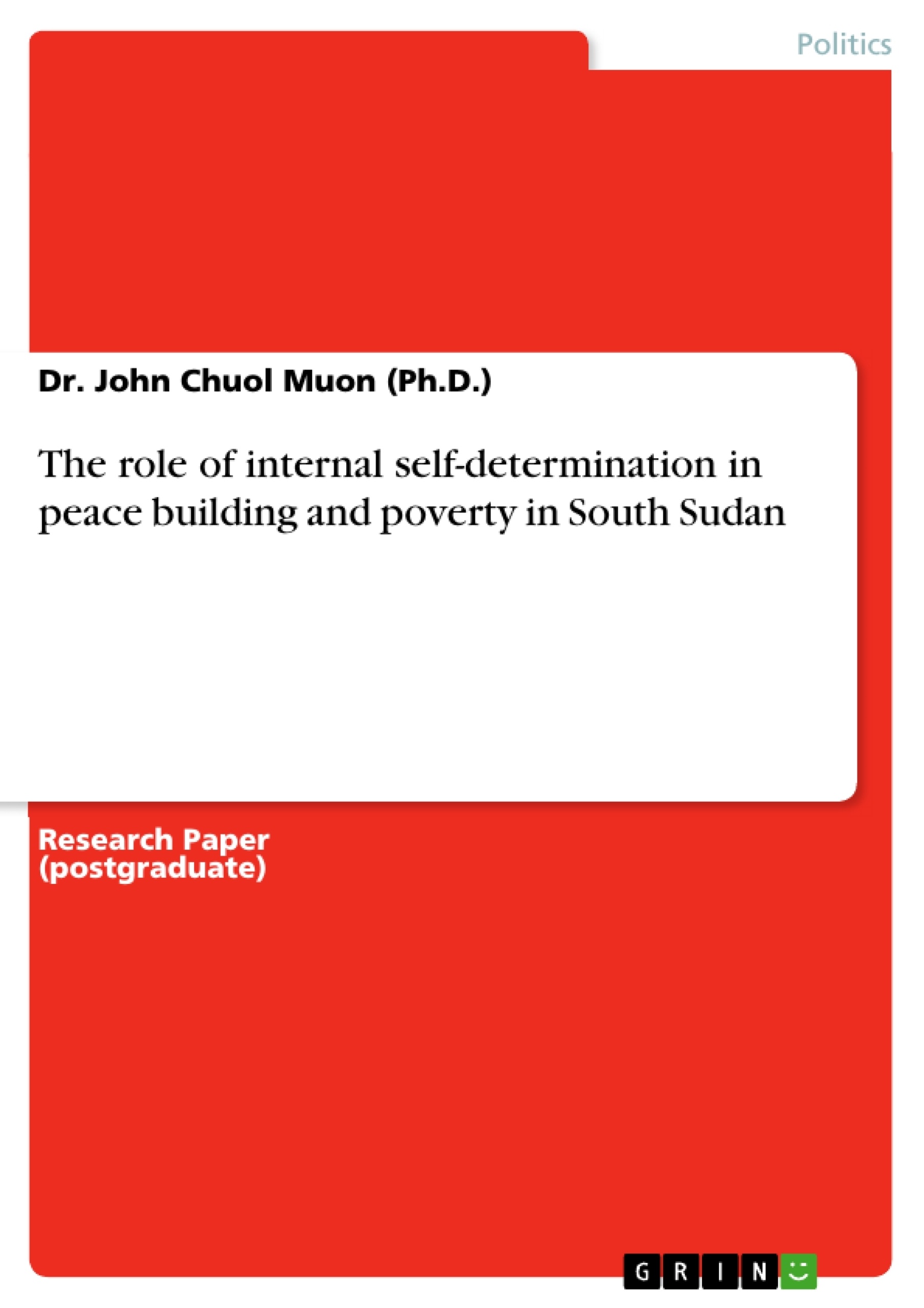Self-determination is a democratic political process in which citizens of a country determine their preferred form of statehood and government for their nation. The right to self-determination is a legal and political right for all people. Self-determination became prominent internationally during and after the First World War. It was also at the Centre of the international political agenda during the decolonisation period. From 1945 onwards, self-determination became an international principle after several international conventions defined the term and its use as a legal justification for creating new states in territories previously under colonial rule. The definition and implementation transformed the concept into a universally-recognised practice. Territories under colonial rule used this concept to seek independence, which led to the creation of more than eighty new states. The struggle of South Sudan for self-determination has a history longer than any other struggle in Africa. The struggle has roots in Sudan's pre-colonial, colonial, and post-colonial political events. Despite these roots, South Sudan sought secession due to fear of Northern domination and internal colonisation in post-independence Sudan and exclusion of Southerners from crucial constitutional discussions on Sudan's future based on the argument that the southerners did not have organised political parties. In seeking peace, South Sudan voted in the 2011 referendum to support internal self-determination by seceding from Sudan. Internal self-determination makes peacebuilding initiatives legitimate and sustainable. However, South Sudan experienced incidences of conflict after seceding from the North. The proposed research aims to determine the role that self-determination plays in peacebuilding initiatives and poverty in South Sudan.
Inhaltsverzeichnis (Table of Contents)
- Introduction
- Literature Review
- Overview
- The historical context of internal self-determination
- The peace process in South Sudan
- Applying internal self-determination to peacebuilding initiatives
- Roles of the international community
- Conclusion
- Methodology
- Research question
- Type of data to use
- Methods
- How the data and methodology will address the research question
- Conclusion
- References
Zielsetzung und Themenschwerpunkte (Objectives and Key Themes)
This research aims to determine the role of internal self-determination in peacebuilding initiatives and poverty reduction in South Sudan. The research will explore the historical context of self-determination, its application in peacebuilding, and the impact of internal self-determination on post-conflict reconstruction efforts in South Sudan.
- The role of internal self-determination in peacebuilding initiatives
- The historical context of internal self-determination
- The impact of internal self-determination on poverty reduction
- The relationship between internal self-determination and post-conflict reconstruction
- The role of the international community in supporting internal self-determination
Zusammenfassung der Kapitel (Chapter Summaries)
The introduction provides a brief overview of the concept of self-determination and its relevance to the study of peacebuilding in South Sudan. It highlights the historical context of self-determination and its application in the struggle for independence in South Sudan.
The literature review section delves into the theoretical framework of internal self-determination and its relationship with peacebuilding. It explores the historical context of internal self-determination and its evolution within the international community. The section further examines the concept of internal self-determination in the context of post-conflict reconstruction and the role of the international community in supporting peacebuilding initiatives.
The methodology section outlines the research question, the data sources, the methods to be employed, and the overall research design. It emphasizes the importance of using a robust methodology to ensure the credibility and reliability of the findings.
Schlüsselwörter (Keywords)
The primary keywords and focus topics of this research include internal self-determination, peacebuilding, poverty, South Sudan, post-conflict reconstruction, international community, historical context, and theoretical framework. These terms represent the core concepts and areas of focus explored in this research project.
Frequently Asked Questions
What is the concept of internal self-determination?
Internal self-determination is a political process where citizens decide their form of government and statehood within a territory, often used as a basis for peacebuilding and legitimacy.
Why did South Sudan seek independence?
South Sudan sought secession from Sudan due to fears of Northern domination, internal colonization, and the exclusion of Southerners from constitutional discussions about the country's future.
How does self-determination relate to peacebuilding?
It makes peacebuilding initiatives more legitimate and sustainable because the political structures are based on the will of the people, though South Sudan still faced conflict after seceding.
What is the impact of self-determination on poverty?
The research explores how establishing a sovereign state allows a nation to control its resources and implement specific policies to reduce poverty, despite post-independence challenges.
When did South Sudan become independent?
Following a referendum in 2011, South Sudan voted for internal self-determination and officially seceded from Sudan to become the world's youngest nation.
- Citation du texte
- Dr. John Chuol Muon (Ph.D.) (Auteur), 2021, The role of internal self-determination in peace building and poverty in South Sudan, Munich, GRIN Verlag, https://www.grin.com/document/1264825



